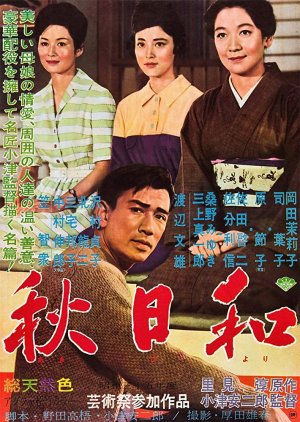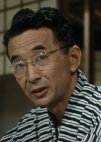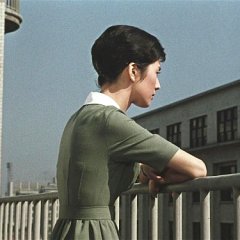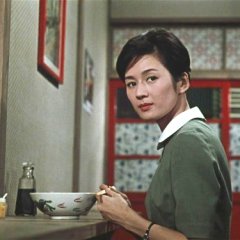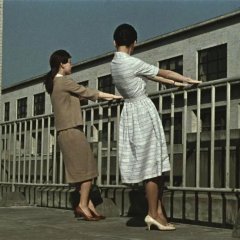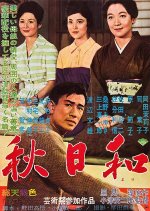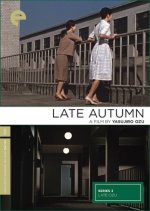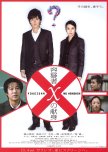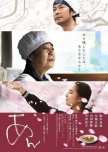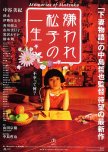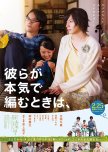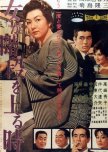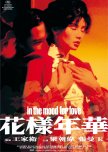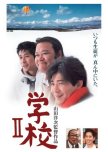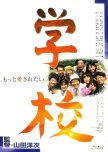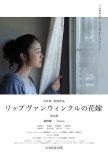- Português (Brasil)
- English
- magyar / magyar nyelv
- dansk
- Título original: 秋日和
- Também conhecido como: Akibiyori ,
- Roteirista e Diretor: Ozu Yasujiro
- Gêneros: Comédia, Drama
Elenco e Créditos
- Tsukasa YokoMiwa AyakoPapel Principal
- Hara SetsukoMiwa AkikoPapel Principal
- Saburi ShinMamiya SoichiPapel Secundário
- Nakamura NoburoTaguchi ShuzoPapel Secundário
- Kita RyujiHirayama SeiichiroPapel Secundário
- Okada MarikoSasaki YurikoPapel Secundário
Resenhas

"Love and marriage aren't always the same thing"
Late Autumn was in many ways a reworking of Ozu’s classic 1949 film Late Spring only this time focusing on a widowed mother and her daughter of marriage age. Three friends of her late husband decided they knew what was best by finding not only a mate for the daughter but the mother as well! Regardless of what the women wanted.At the memorial service for their friend Miwa, three old friends, Mamiya, Hirayama, and Taguchi ask Miwa’s widow, Akiko, if she would like help matchmaking for her daughter Ayako. She agrees and after she’s left the men discuss how much each one of them had a crush on Akiko when they were younger, not always in the most respectful ways. The men get to work finding a suitable prospect but run into a wall when they discover Ayako doesn’t want to wed for she fears leaving her mother alone. That knowledge only spurs them on. Mamiya finds out by accident that Ayako has started dating one of the prospects she’d rejected. When he called her on it she said it didn’t change anything. Love and marriage were not necessarily the same thing. The men change tactics and decide to have Akiko marry one of them which turns her small, quiet household upside-down!
Despite their sometimes crass language, the three men’s hearts were in the right place. They wanted the best for Akiko and Ayako. There was more innuendo in this film than most Ozu films. I really didn’t need to hear about the men’s “itches”. Akiko and Ayako had a close relationship that was tested. Fortunately for all involved, Ayako’s friend, Yuriko, stepped in and sorted the men out in the best scene of the whole movie. She then went to work on the mother and daughter.
Ayako feared marriage would cause her to lose her friends as she’d seen with her own friends that married. She also feared becoming distant from her mother and leaving her mother alone, with no one. Despite not being as independent as Yuriko, she enjoyed her independence and feared losing it, too. Akiko, with Hara Setsuko playing her, was the epitome of grace and generosity. The three men were all a little in love with her which even their wives knew.
Ozu’s palette was much the same-muted colors highlighted with green, yellow, and his favorite color red. His red teapot was replaced by a prominent yellow one here. The steady camera set low with the people moving instead was a constant as well as the intricately composed frames. Many of the same players from previous films showed up here like old friends. There’s a comfort and familiarity with his post-war films.
Despite having covered much of the same topics in previous films-the changing Japanese family, aging, and loneliness, he still had more to say. I enjoyed this film more than Late Spring with Hara as the mother instead of the daughter. Okada Mariko’s presence gave the film a jolt of energy when the talking began to go in circles. As bachelor Ozu aged, so did it seems, the boys from his silent films. Still incorrigible with good hearts, only now old men sitting together drinking sake and meddling in other people’s lives…with good intentions of course.
6 February 2024
Esta resenha foi útil para você?

Another variation on a theme by Ozu
Late Autumn (1960) is Ozu's 3rd to last film. It is recommended not to start one's Ozu exploration with this film. Wait to have seen at least four or more Ozu films. Late Autumn is a strong film, but essentially a variation on past films. Yet, it is quite enjoyable and not boring even if this is your 20th+ Ozu film. In fact, this film is more appreciable for those that have worked their way through Ozu's films, especially the post-war ones in which Setsuko Hara is introduced. It is after viewing those prior films that we are well acquainted with Setsuko's roles in the Ozuverse.There is something about Setsuko's roles that holds a 'constancy' to a certain human temperament. Setsuko's roles are often melancholic and pure, even if they are understated. Perhaps Setsuko's roles better convey 'mono no aware' than any other Ozu characters. Her characters are wholesome, wonderful, but it is transient; while we may catch glimpses of this human character in ourselves or throughout our lives, it is a rare quality, easily squashed in our brutish world, which distorts that temperament in people that can be pure, graceful, and delicate.
Late Autumn excels in utilizing its versatile cast without any character(s) dominating the plot or screen. All are enjoyable. The trio of old men are comical together; their old-fashion and subtle mischievousness contrasts with Sasaki Yuriko's forward communication and modern woman temperament. It was refreshing to observe Yuriko's forwardness in an Ozu world full of politeness and subtlety. Her character role helps break the ice and push through a few social impasses. The exchange where the young Yuriko chews out the old men is terrific. The old men's interactions with their wives, children, and maids is also enjoyable; their loved ones seem to know the old men so well. The comedy here is that the old men try so hard to be clever but are quickly found out by all.
One of the most accomplished aspects of Late Autumn, compared to other Ozu films, is the music. In this viewing, I found little to be lacking in the music. Late Autumn's music is sophisticated, precise, and synced to the action, and does a remarkable job of conveying 'soaring happiness' or 'resigned melancholy'.
Overall, Late Autumn's presentation is bright and cheerful. It belies the more melancholic themes of the film, which are disguised through frequent interjections of comedic scheming. Ozu also limits the melancholy we can access. Several times, we see Setsuko's character, Akiko, kneeling on a mat and looking away (we cannot see her face); certainly, she is sad but the decision not to show her sorrowful face is an interesting decision.
Esta resenha foi útil para você?
Recomendações
There have been no recommendations submitted. Be the first and add one.

